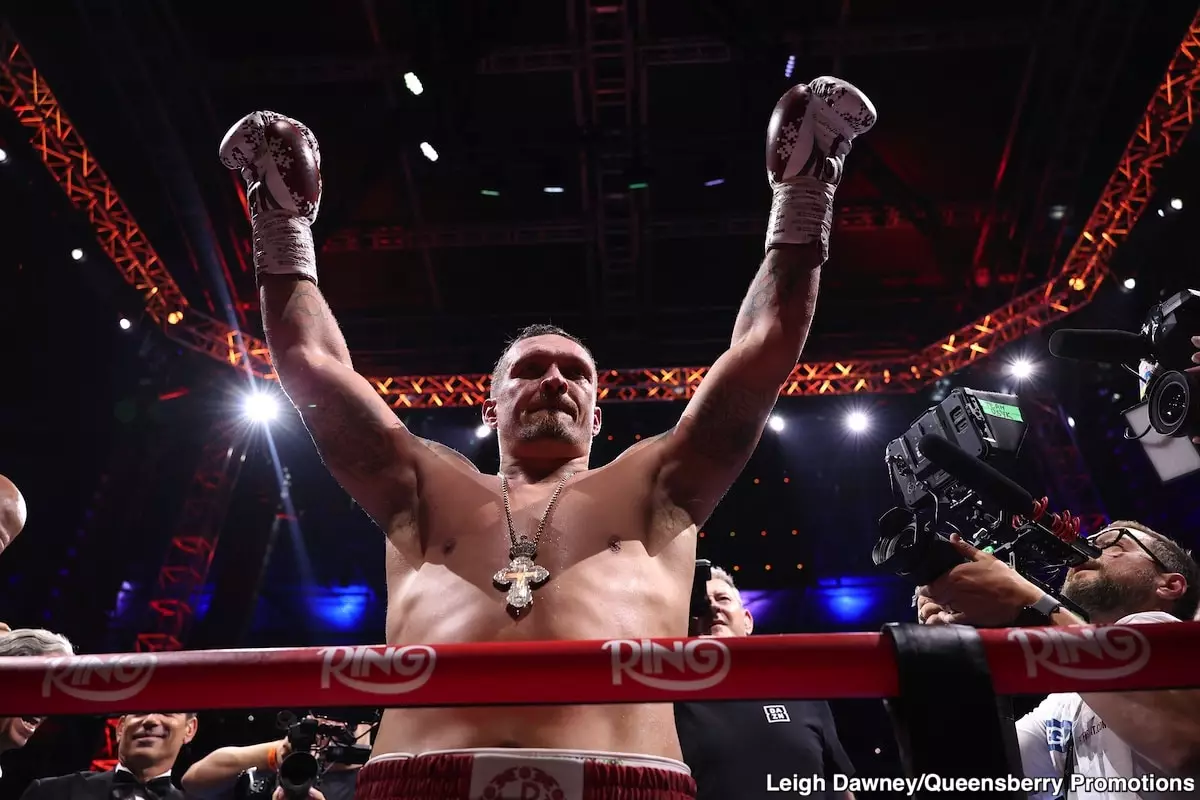Oleksandr Usyk’s emergence as a dominant force in the heavyweight division has sparked intense debate among experts, fans, and fellow fighters alike. With an impressive record and a unique blend of skill and resilience, Usyk has positioned himself as one of the most compelling figures in boxing today. His ability to transition successfully from cruiserweight, where he unified multiple belts, to heavyweight, where he’s already defeated some of the sport’s most formidable opponents, is nothing short of extraordinary. But perhaps what truly elevates Usyk’s stature is the manner in which he has achieved this—without the long list of title defenses or years of reign, yet with a clarity of skill and purpose that suggests future greatness.
This rapid ascension begs the question: how high can Usyk climb in the pantheon of boxing legends? Given his limited number of fights at heavyweight—only eight—his resume is remarkably concise yet impactful. Beating champions like Anthony Joshua, Tyson Fury, and Daniel Dubois shows he’s capable of handling diverse styles and formidable opponents. Yet, the critics argue that eight wins are not enough to place him among the all-time greats; history has often favored those with longer, more sustained reigns. Still, Usyk’s accomplishments deserve respect and recognition, raising the possibility that in a short period, he may have already written himself into the story of heavyweight greatness.
Assessing the Greatness: Is Usyk Top 10 or Top 5?
The debate about Usyk’s legendary status brings us to a broader discussion about what makes a “great” in boxing. Is it the number of fights, the quality of opposition, the ability to adapt, or a combination of all these factors? From his perspective, Usyk has checked all the boxes, overcoming bigger and often more physically imposing opponents with superior technique and tactical intelligence. His victory over Joshua, for example, demonstrated not only skill but also patience, resilience, and adaptability—traits that are hallmarks of all-time champions.
Some boxing historians and analysts suggest that ranking Usyk in the top 10 all-time heavyweights is an easy call. He has already defeated TWO reigning champions at heavyweight, a feat few in history have managed, especially in such a short span. When it comes to top 5, however, the debate intensifies. Critics argue that majority of those slots are reserved for fighters with longer dominance, more defenses, and a greater number of title reigns. But as former champion Eddie Hearn indicates, if we consider the quality of opponents and the potential for future fights, Usyk’s case becomes compelling for inclusion higher up the list.
Hearn’s bold claim—that Usyk could beat legendary fighters like Holmes, Tyson, Frazier, and Liston—may seem optimistic, yet it highlights a broader narrative: Usyk’s exceptional skill set transcends generations. His technical prowess echoes the finesse of Muhammad Ali and the strategic mind of Larry Holmes, while his resilience under pressure draws parallels to Frazier and Liston. The notion that Usyk, smaller than many of his rivals yet equally formidable, could outperform fighters from different eras makes a strong argument that he’s a generational talent capable of pushing the boundaries of what we consider “greatness.”
The Historical Context and Future Potential
Comparing Usyk to legends of past eras—particularly the giants of the 1970s—raises intriguing questions about weight and style. Fighters like Frazier and Liston, who weighed around 220 pounds, often relied on speed, technique, and relentless pressure rather than sheer size. Usyk embodies this archetype: a highly skilled boxer with a compact frame, capable of executing technical mastery against larger opponents. His fights against Tyson Fury and Anthony Joshua, both of whom tower over him, solidify his status as a fighter capable of competing across different generations.
The critical question is whether Usyk has peaked or still has room for growth. With only a handful of fights at heavyweight, the potential for more significant victories—and possibly title unification—remains. If he continues to face and beat top contenders like Joe Parker or the promising Moses Itauma, his case for being among the greatest in history will only solidify. Conversely, critics might argue that without a longer period of dominance, it’s premature to crown him a legend. Nonetheless, the foundation of his career suggests he is on a trajectory that could reshape the heavyweight landscape for years to come.
Moreover, Usyk’s approach, marked by technical brilliance, tactical adaptability, and unyielding determination, indicates he could transcend the limitations of current perceptions about size and power. His fights serve as a reminder that boxing greatness doesn’t solely rest on physical dominance but also on strategic mastery and mental toughness. If he maintains this trajectory, it’s conceivable that we will look back and see him as a pioneer redefining what it means to be a heavyweight champion.
Challenging the Limits of Legacy
What separates Usyk from nearly everyone else in today’s heavyweight division is his mastery of different fighting styles and his refusal to be boxed into a single narrative. While most champions rely heavily on their size and knockout power, Usyk has demonstrated that finesse, intelligence, and technique can overcome traditional physical advantages. This trait makes him a unique candidate for a spot among boxing’s elite, capable of rejuvenating debates about the nature of greatness.
Eddie Hearn’s comments—his confident assertions that Usyk could beat legends like Tyson and Holmes—are not just hype; they reflect a belief in Usyk’s transcendent talent. While such statements are inherently subjective and speculative, they serve to challenge the conventional hierarchy of heavyweight greatness. If Usyk continues to add big-name victories and sustains his high level of performance, it’s not far-fetched to argue that he could be on the cusp of rewriting history.
In essence, Oleksandr Usyk’s journey is about more than just a collection of impressive wins; it’s about challenging established narratives and inspiring future generations to value skill and intellect as much as raw power. His legacy, still in its early stages, has the potential to evolve into something truly groundbreaking—if he continues to defy expectations and cement his place among the all-time greats.

